When Rebecca Holcombe, director of community programs at Common Ground, trains new staff members, they often ask about the “rules.”
Observing the day-to-day activity at the high school, urban farm and environmental center, this seems a valid question.
First of all, there’s a lot.
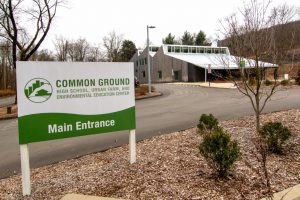
Common Ground, located at the base of West Rock Ridge State Park in New Haven, offers an impressive range of constant programming, from free family hikes and campfires to a bustling summer camp, as well as the daily schedule of an environmentally focused charter school.
What’s more, the organization’s primary focus, in each of its well-honed programs, is on connecting people with nature. And nature can be, well, unpredictable.
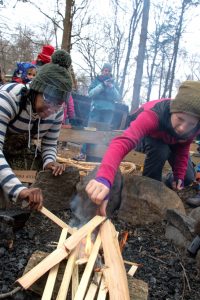
So when Holcombe gets asked that question by new staff, she has a standard, solid reply: “We don’t have those types of rules here.”
That’s not to say there aren’t rules; they’ve got plenty. But cultivating a sense of freedom and adventure within the safe confines of the natural world on Common Ground’s campus is a big part of why what they do there is so special.
It’s why children and adults taking part in the programming offered throughout the year – whether they’re climbing trees, building fairy houses, studying environmentalism, roasting bannock (a type of quick bread) over open flames or feeding the sheep, goats and chickens that live on the farm – are having so much fun.
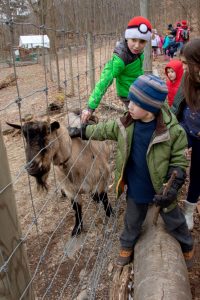
And importantly, those experiences are why families might start including more outdoors time their day-to-day lives beyond Common Ground; it’s why the young people hanging out there very well might be tomorrow’s environmental justice leaders.
Before getting too far into the philosophy behind these programs, however, it’s best to start with a primer on the basics. Common Ground does so much so well, which means there are a lot of ways to get in on all that fun.
First, a little history: Common Ground’s founders, including teachers, environmentalists and philanthropists, set out to create an environmental learning center in the late 1980s. After several years of running pilot programs and seeking out a permanent home, Common Ground High School was approved as a charter in 1997. Today, the school boasts a 100 percent college acceptance rate for its attendees, who participate in unique courses like environmental justice, food and the environment, and environmental education. Furthermore, Common Ground’s Green Jobs Corps program connects them to paying environmental jobs within the community – including jobs at Common Ground itself.
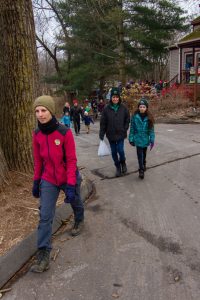
From there, community programming grew. And grew.
Common Ground started with 35 kids in its first year running summer camp; it’s expanded to nearly 1,000 kids annually today. Other activities increased to include festivals, school field trips, “Open Farm Days,” family hikes, the “Seedlings” nature class for young children, birthday parties, a robust afterschool school programs and an urban farm that produces more than 10,000 pounds of locally grown produce each year. Then there’s Common Ground’s CT Schoolyards Program, helping New Haven schools create educational garden programs on site.
More recent programs have helped to even further spread their mission. The NatureYear, a program available to families through an application process, allows elementary-aged school children from anywhere in the state to visit the campus once a week (instead of one day of attending regular school, or in addition to home-schooling) for nature-based learning. Enrolled children are outside most of the day, if possible, and collaborate on activities including animal tracking, fort-building cooking and – importantly – group problem-solving.
It’s not so much a science program as it is a social and emotional program, with children from different backgrounds coming together in ways they might not in school.

“NatureYear meets my daughter’s energy and curiosity at just the right point. While our family has always valued outdoor play, NatureYear augments our experiences at home and in the world,” says Erika Simonian, parent of a seven-year-old NatureYear student. “We have outdoor fires on cold days and notice our environment in more detail than I ever did growing up – the colors of moss, observation of trees, plants – and animal activity, whether it be bird-watching, tracking, etc.”
Families not enrolled in regular programming can reap these benefits, too. One of Common Ground’s newest regular community events is the Nature Playdate and has proven remarkably popular, offering families the opportunity to visit the campus for both unstructured and structured play on a weekend afternoon. Holcombe says they’ve been delightfully surprised to find 200 to 400 people coming out for the events, even in overcast 30-degree winter weather.
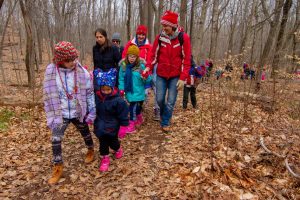
“It’s been so powerful,” she says, of watching children and families revel in nature, happily getting dirty, expressing creativity and making friends in the process. “The energy on campus is so joyful.”
This depth of programming means that on any given day, Common Ground is awash in activity. Rather than chaos, though – which parents might expect when imagining young people engaging in unbridled exploration outside – the vibe is serene, if jubilant. From the high schoolers working out math problems during a break in the cafeteria to NatureYear students observing plants along a trail, experiences at Common Ground unfold in tandem, creating an environment with a strong sense of connectivity and purpose. Common Ground High School students are some of the key staff members for community programming, for instance, and NatureYear families promote weekend programs among friends.
That’s no accident.
“Because there is so much going on here, connecting the pieces is something we are always trying to work on,” says Joel Tolman, Common Ground’s director of impact and engagement.

Starting with a basic idea – that every individual and family has a right to connect with the natural world and the sources of their food – staff at Common Ground continually work on ways to ensure experiences click for those involved.
“How do we create these pathways and that experience here?” says Tolman. “How do we meet people where they are?”
The breadth and integrity of their offerings are two answers. Common Ground has as much room for the adventure-seeking outdoorsman as it does for the young child who has just had her first taste of mint – right out of the garden – at a friend’s birthday party.
That first taste might lead to more: attending summer camp or becoming a high school student or nature educator, Tolman says.
And as the Common Ground staff and families have seen firsthand, making those first connections can truly alter an individual’s relationship with the natural world.
“You carry those values into the future,” says Holcombe.
“Having our kids in Common Ground programs – NatureYear in particular, has made us much more adventurous as a family. I used to be self conscious and nervous taking the kids into the nearby woods of Edgewood Park. Now we take ‘adventure walks’ in all seasons,” says Joanna Price, the mother of a six-year-old NatureYear student. “I thought people passing by would give us strange looks as my kids climb, play, and explore in their rain suits and boots, but the comment we get the most is, ‘It’s so nice seeing kids be kids!’”
That brings us back to the idea of risk and rules; the concept of feeling comfortable enough to explore the natural world with confidence – and appreciate the environment so much more, because of it.
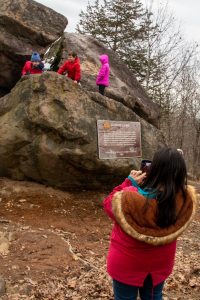
“There are wide-open boundaries here,” says Holcombe – before adding, “but there are boundaries!” Common Ground offers its visitors the chance to wander, create and observe in a safe place, then take that gleaned enthusiasm home, and beyond.
Holcombe, who says she’s learned to appreciate the value of the programming all the more since having children herself in recent years, notes the sensory details on the campus at Common Ground as the ideal background for this type of lifelong learning: frogs croaking in the wetlands or baby chicks hatching from eggs laid on site.
These unforgettable sights and sounds define the experience for staff, students and visitors at Common Ground.
“I really believe in connecting kids to nature,” she says. “You carry those values into the future.”
Photography by TONY BACEWICZ



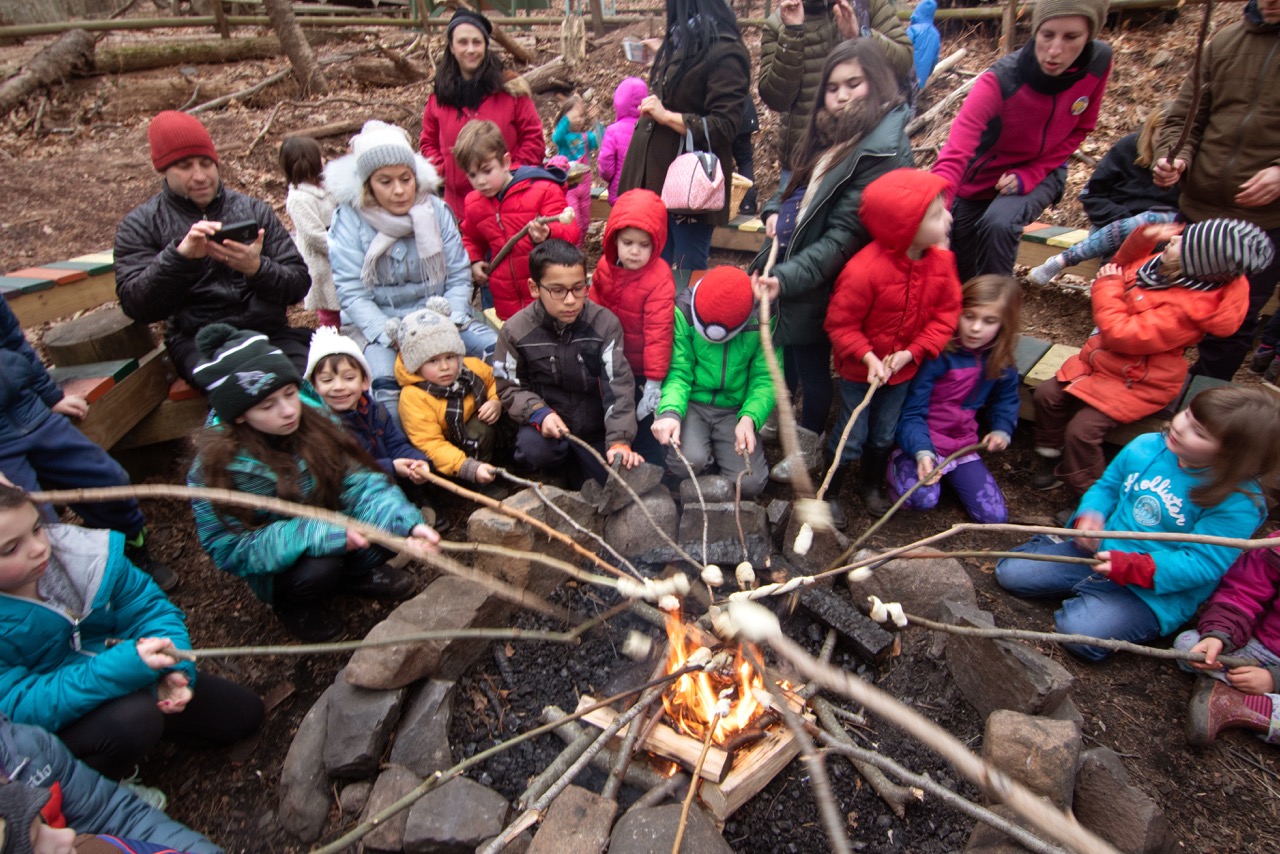



More Stories
Autism Families CONNECTicut Steps Up for the Local Community Building a Nonprofit From the Ground Up
Hospital for Special Care’s Ivan Lendl Adaptive Sports Camp
Special Olympics Connecticut: Supporting and Inspiring a Special Community